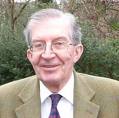
Nicholas Lash
Catholic theologian, Nicholas Lash, reflects on how the nature of theological thought shares much in common with all academic endeavour including science. In a speech given on the occasion of receiving an honorary degree from Durham University, he claims that all good reasoning proceeds from prior commitments and beliefs.
An edited version of this speech was published in the Guardian on 2nd July 2011
Over forty years ago, I was taking part in a seminar in the course of which the Australian Jesuit theologian, Gerald O’Collins, defined the theologian as someone who “watches their language in the presence of God”. To get a sense of just how good a definition this is, set it alongside the definition of a philosopher as someone who “watches their language”.
There are many theological tasks which can be undertaken, quite competently, by a nonbeliever: much of church history and biblical exegesis, for example. But the very heart and centre of theological investigation is reflection before the face of the transcendent mystery which we call God. Theological investigation is, in St Anselm’s motto, a matter of “fides quaerens intellectum”: “faith in search of understanding”. It follows (and this is what O’Collins’ definition brings out so well) that serious theological investigation is never purely a matter of inference and deduction; never merely a matter of the reasoning mind. It is also a matter of the mind and heart at prayer. There is a sense in which all good theology is done on one’s knees.
But, if this is the case, does it not follow that theology is so unlike all other academic disciplines – which are, presumably, purely matters of the reasoning mind – that is far from clear that the university is the proper place for its pursuit?
Before reaching this conclusion, however, it would be prudent to have a look at the ways in which, in practice, other patterns of enquiry are conducted.
The Dominican theologian, Herbert McCabe, once told me that, when translating Thomas Aquinas into English, he often found that the best translation of “intellectus”, in his writings, was not “intellect” or “understanding”, but “imagination”. It seems to me that the abstractly rationalist accounts of “scientific” method which seem so often to be taken for granted are curiously silent about the role played by the imagination in the work of the particle physicist, the organic chemist, the historian, or the legal theorist. From the fact that the testing of claims, and the evaluation of evidence, must be undertaken with relentlessly critical disinterestedness, it does not follow that work thus done is done without the lively exercise of the imagination.
We can go further. Many of the debates conducted in the 1960s about scientific “realism” look very dated now. Good work, in any academic discipline, requires a passionate concern for accuracy, for truthfulness; requires what it would not be in any way metaphorical to describe as reverence for the matter at hand. Scholars and scientists of every kind are servants of the real, disciples of truth. Moreover, all good reasoning expresses and proceeds from prior commitments and beliefs and relies, at every step along the way, on believing – however cautiously and critically – the testimony of others engaged in this and similar collaborative enterprises. I emphasize “collaborative” because, at the heart of the inadequacy of frequently repeated accounts of the supposed incompatibility of “science” and “religion”, and of the imagined conflicts between “faith” and “reason” is the failure to appreciate that all our intellectual enterprises are social enterprises, projects undertaken in community.
Some years ago, in a remarkable essay entitled ”Real Presences: Is there anything IN what we say?”, George Steiner argued that “any coherent understanding of what language is and how language performs … is, in the final analysis, underwritten by the assumption of God’s presence”. One supposes that many of his readers found this contention utterly bizarre. Steiner went on to argue that the only way back to recognition of that presence would be through acknowledgement of what he called “the core of trust within logic itself, where ‘logic’ is a ”Logos-derivative”. There would, he said, be “no history as we know it, no religion, metaphysics, politics or aesthetics as we have lived them, without an initial act of trust, of confiding”, so fundamental as to be constitutive of the relation between word and world”.
Perhaps, at the end of the day, it is not that theology is so unlike other academic enterprises as not to earn its place in the university, but rather that we have lost sight of the extent to which other academic enterprises are, as social projects, projects undertaken in community, rather more like theology than they know.
Nicholas Lash, on the occasion of receiving an honorary degree from Durham University, June 2011.



